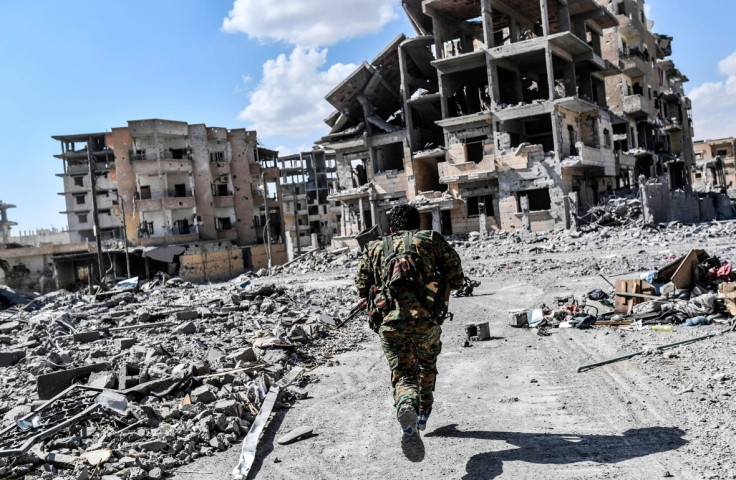Syria's Raqqa 'liberated' from Isis
Isis seized Raqqa in 2014, turning it into the capital of its self-declared Caliphate.
The Syrian city of Raqqa has been liberated from the Islamic State (Isis) terror group, the Syrian Observatory for Human Rights said on 17 October.
Isis seized Raqqa in 2014, turning it into the capital of its self-declared Caliphate. The group is progressively losing territories in both Syria and Iraq due to multinational offensives that have led to the recapture of several territories held by the militants.
Raqqa has witnessed intensified fighting in recent months after the Syrian Democratic Forces (SDF) – an alliance of Kurdish and Arab militias supported by a US-led coalition – started a campaign to recapture the Isis stronghold.
Earlier reports suggested coalition forces were advancing in the city and only a handful of foreign militants remained in the area, clustered in one small zone around the city's national hospital and stadium.
The SDF took the National Hospital after fierce fighting resulted in the death of several Isis militants on 17 October.
Later on in the day, SDF fighters raised a militia flag inside Raqqa Stadium, Reuters said. The flag bore the emblem of the Kurdish YPG, the strongest militia group within SDF. It was raised where fighting had ended, but the area still needs to be cleared of landmines.
"We do still know there are still IEDs and booby traps in and amongst the areas that ISIS once held, so the SDF will continue to clear deliberately through areas," said Colonel Ryan Dillon, spokesman for Operation Inherent Resolve (OIR), the US-led coalition against Isis.
The alliance's spokesman Talal Sello told AFP: "Everything is finished in Raqqa, our forces have taken full control of Raqqa." He added that coalition forces were still working to locate and remove remaining "sleeper cells".
Witnesses said coalition fighters were celebrating on the streets, chanting slogans from their vehicles.
On Monday, the SDF captured "Paradise Square," Raqqa's infamous public square that was used by the militants to perform beheadings and other killings in front of residents who were summoned by loudspeakers and forced to watch. Bodies and severed heads would be displayed there for days, mounted on posts and labeled with their crimes, according to residents, who later dubbed it "Hell Square."
The Observatory said regime forces had brought the entire area between Deir Ezzor city and Mayadeen under their control.
"These are not desert areas, they are villages along the Euphrates that were IS strongholds," the monitor said. "The Islamic State group is collapsing under pressure from the regime in Deir Ezzor province."
A convoy of Syrian Isis fighters quit Raqqa on 15 October and between 200 and 300 militants are thought to remain.
Foreign fighters were barred from leaving Raqqa with the surrendering local Isis militants as part of a deal between local officials and tribesmen. Thousands of civilians have also fled since the offensive to recapture Raqqa began in June 2017.
In another major blow against the militants, Iraqi troops aided by a foreign coalition recaptured Mosul, Isis' stronghold in Iraq, this summer.
Historic pictures by @Kilicbil today in Al-Naim square -- once infamous for IS atrocities, now dotted with yellow flags of SDF pic.twitter.com/lYqKRyIYro
— Maya Gebeily (@GebeilyM) October 17, 2017
"The final liberation of Raqqa from Isis is a massive blow to the group's idea of a physical Caliphate that made Isis seem more credible to its followers. and attracted global support and influx of volunteers than Al-Qaeda did," counter-terrorism expert David Otto told IBTimes UK.
"Raqqa was seen as the last stronghold of Isis, but the recapture does not signal the end of the Islamic extremist ideology, which is the foundation that holds the group together with support and sympathy from all corners of the world," he continued.























